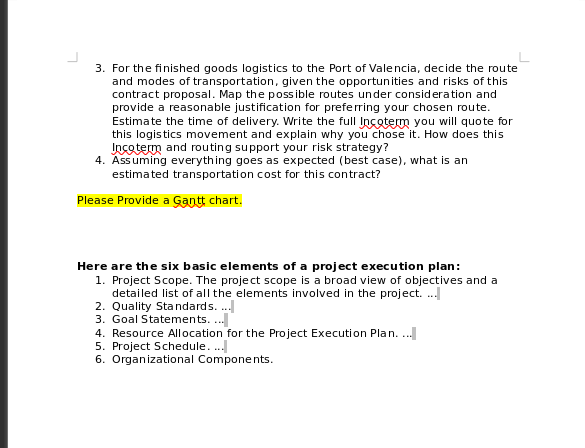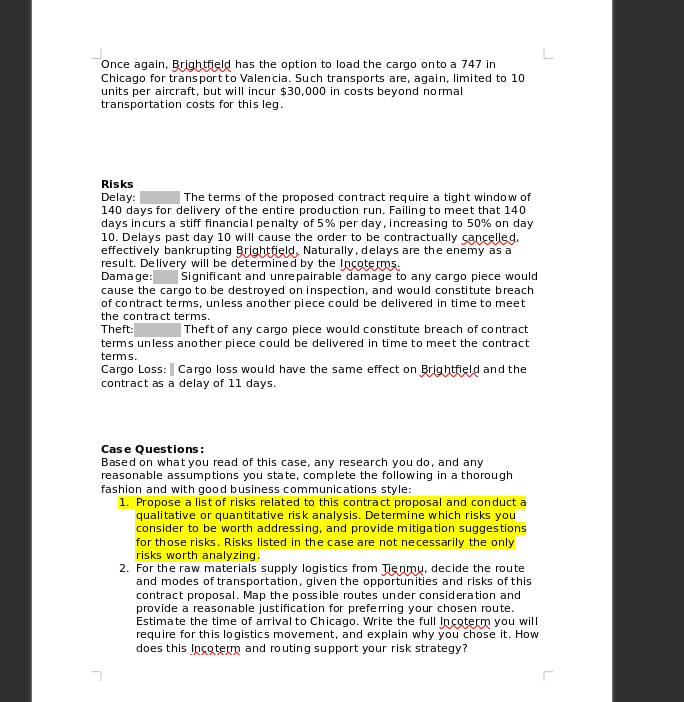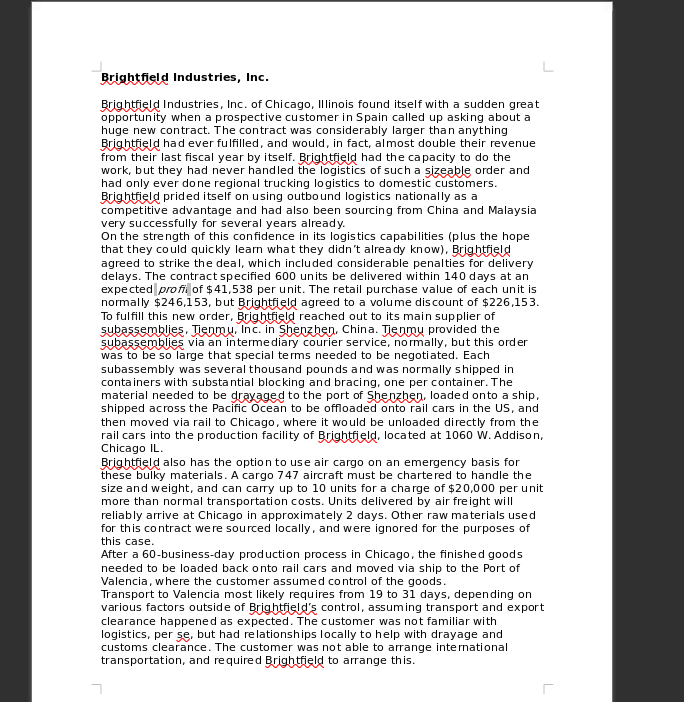3. For the finished goods logistics to the Port of Valencia, decide the route
and modes of transportation, given the opportunities and risks of this
contract proposal. Map the possible routes under consideration and
provide a reasonable justification for preferring your chosen route.
Estimate the time of delivery. Write the full Incoterm you will quote for
this logistics movement and explain why you chose it. How does this
Incoterm and routing support your risk strategy?
4. Assuming everything goes as expected (best case), what is an
estimated transportation cost for this contract?
Please Provide a Gantt chart.
Here are the six basic elements of a project execution plan:
1. Project Scope. The project scope is a broad view of objectives and a
detailed list of all the elements involved in the project. ...
2. Quality Standards....
3. Goal Statements...
4. Resource Allocation for the Project Execution Plan. ...
5. Project Schedule....
6. Organizational Components./nOnce again, Brightfield has the option to load the cargo onto a 747 in
Chicago for transport to Valencia. Such transports are, again, limited to 10
units per aircraft, but will incur $30,000 in costs beyond normal
transportation costs for this leg.
Risks
Delay:
The terms of the proposed contract require a tight window of
140 days for delivery of the entire production run. Failing to meet that 140
days incurs a stiff financial penalty of 5% per day, increasing to 50% on day
10. Delays past day 10 will cause the order to be contractually cancelled.
effectively bankrupting
result. Delivery will be deterd, Naturally, delays are the enemy as a
by the Incoterms.
Damage:
Significant and unrepairable damage to any cargo piece would
cause the cargo to be destroyed on inspection, and would constitute breach
of contract terms, unless another piece could be delivered in time to meet
the contract terms.
Theft:
Theft of any cargo piece would constitute breach of contract
terms unless another piece could be delivered in time to meet the contract
terms.
Cargo Loss: Cargo loss would have the same effect on Brightfield and the
contract as a delay of 11 days.
Case Questions:
Based on what you read of this case, any research you do, and any
reasonable assumptions you state, complete the following in a thorough
fashion and with good business communications style:
1. Propose a list of risks related to this contract proposal and conduct a
qualitative or quantitative risk analysis. Determine which risks you
consider to be worth addressing, and provide mitigation suggestions
for those risks. Risks listed in the case are not necessarily the only
risks worth analyzing.
2. For the raw materials supply logistics from Tienmu, decide the route
and modes of transportation, given the opportunities and risks of this
contract proposal. Map the possible routes under consideration and
provide a reasonable justification for preferring your chosen route.
Estimate the time of arrival to Chicago. Write the full Incoterm you will
require for this logistics movement, and explain why you chose it. How
does this Incoterm and routing support your risk strategy?/nBrightfield Industries, Inc.
Brightfield Industries, Inc. of Chicago, Illinois found itself with a sudden great
opportunity when a prospective customer in Spain called up asking about a
huge new contract. The contract was considerably larger than anything
Brightfield had ever fulfilled, and would, in fact, almost double their revenue
from their last fiscal year by itself. Brightfield had the capacity to do the
work, but they had never handled the logistics of such a sizeable order and
had only ever done regional trucking logistics to domestic customers.
Brightfield prided itself on using outbound logistics nationally as a
competitive advantage and had also been sourcing from China and Malaysia
very successfully for several years already.
On the strength of this confidence in its logistics capabilities (plus the hope
that they could quickly leam what they didn't already know), Brightfield
agreed to strike the deal, which included considerable penalties for delivery
delays. The contract specified 600 units be delivered within 140 days at an
expected profil of $41,538 per unit. The retail purchase value of each unit is
normally $246,153, but Brightfield agreed to a volume discount of $226,153.
To fulfill this new order, Brightfield reached out to its main supplier of
subassemblies. Tienmu, Inc. in Shenzhen, China. Tienmu provided the
subassemblies via an intermediary courier service, normally, but this order
was to be so large that special terms needed to be negotiated. Each
subassembly was several thousand pounds and was normally shipped in
containers with substantial blocking and bracing, one per container. The
material needed to be drayaged to the port of Shenzhen, loaded onto a ship,
shipped across the Pacific Ocean to be offloaded onto rail cars in the US, and
then moved via rail to Chicago, where it would be unloaded directly from the
rail cars into the production facility of Brightfield, located at 1060 W. Addison,
Chicago IL.
Brightfield also has the option to use air cargo on an emergency basis for
these bulky materials. A cargo 747 aircraft must be chartered to handle the
size and weight, and can carry up to 10 units for a charge of $20,000 per unit
more than normal transportation costs. Units delivered by air freight will
reliably arrive at Chicago in approximately 2 days. Other raw materials used
for this contract were sourced locally, and were ignored for the purposes of
this case.
After a 60-business-day production process in Chicago, the finished goods
needed to be loaded back onto rail cars and moved via ship to the Port of
Valencia, where the customer assumed control of the goods.
Transport to Valencia most likely requires from 19 to 31 days, depending on
various factors outside of Brightfield's control, assuming transport and export
clearance happened as expected. The customer was not familiar with
logistics, per şe, but had relationships locally to help with drayage and
customs clearance. The customer was not able to arrange international
transportation, and required Brightfield to arrange this.





